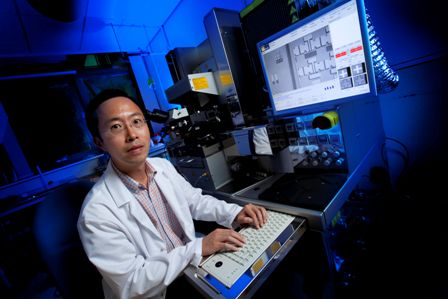Welsh project to develop blood glucose monitor that can text alert in emergency
8 September 2011
Scientists from Swansea University and Welsh companies are developing a next generation blood glucose-monitoring sensor that will send a text alert when there is danger of a hypoglycaemic attack.
The project will combine expertise in nanoelectronics and ehealth and involve the expertise and state-of-the-art facilities from the Centre for Nanohealth and ehealth Industries Innovation Centre at Swansea University.
The £470,000 research project is backed by the Welsh Government’s EU-funded Academic Expertise for Business (A4B) programme which promotes industrial collaboration to help turn research into commercial viable products, processes and services.
The overall aim is to develop a low-cost, non-invasive, ambulatory and continuous monitoring system using novel sensors and mobile network.
Dr Vincent Teng, a nanoelectronics expert from Swansea University’s College of Engineering, is leading the project and said that the blood glucose management will significantly improve the quality of life of diabetic patients and their families.
“Diabetic patients with low blood glucose can become unconscious due to hypoglycaemia and there are many reported incidents where patients, who either live or work alone, fainted without the notice of others and such occurrence can often be fatal.
“Therefore, a multi-functional monitoring system is important to manage the glucose level of diabetic patients and to provide warning when the patient is unconscious.”
The device being developed in Wales involving both nanotechnology and wireless mobile technology will transmit readings from the sensor to mobile phones and subsequently to the NHS and the clinical team responsible for the patient care. It will also provide an emergency alert to next of kin or medical personnel if the patient is suffering from hypoglycaemia attack.
The device will provide continuous blood glucose measurement using nanowires biosensor, unlike the commonly used ‘finger stick’ glucose meter that requires patients to carry out up to ten tests a day.
It will also differ from the majority of products on the market, as the process is non-invasive and pain free. The blood sample is collected via an array of micro-needles — measuring less than 1mm from the dermal layer of the skin — which has fewer nerve endings.

Dr Vincent Teng of Swansea University’s College
of Engineering examines nanowire biosensors using state-of-the-art
fabrication techniques at the Centre for NanoHealth.
Edwina Hart, Minister for Business, Enterprise, Technology and Science, said it has the potential to create significant health benefits for patients, savings for the NHS and create direct benefits for the Welsh economy: “It is another example of the high level research being undertaken in Wales with support from the Welsh Government and illustrates the importance of our universities working in collaboration with industry to bring new products to market.”
The prototype is to be developed over the next 30 months and will have a direct and rapid route to market through the industry consortium. The monitoring system will have the capability to be adapted for other chronic conditions, such as coronary heart disease, stroke, cancer and asthma etc.